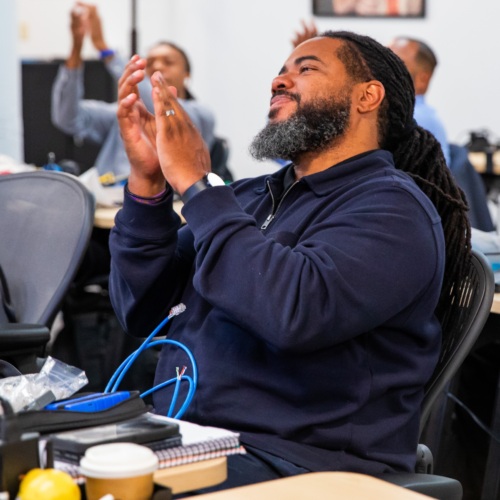
How Financial Literacy Fuels Economic Mobility
Many wealthy people, including Oprah Winfrey, J.K. Rowling, and Ralph Lauren, started from humble beginnings and rose from poverty. These individuals are shining examples of those who capitalized on upward economic mobility.
Economic mobility refers to the ability of individuals or families to improve their economic status over time, either within their lifetime or across generations, often measured by changes in income and wealth. Regardless of background, anyone can build wealth based on skills, abilities, and efforts.
While nothing surpasses hard work and dedication, those who learn to make their money work for them can steadily climb the economic ladder. They can also safeguard themselves against unforeseen life events and build wealth, just one benefit of financial literacy. Budgeting, financial management, taxation, and investing play vital roles in this process.
A solid financial literacy foundation can fuel career growth by enabling informed decisions, facilitating better salary negotiations, reducing financial stress, and promoting strategic career planning. This can ultimately lead to increased financial security and career advancement. However, the knowledge, skills, and behaviors associated with financial literacy and their significance are often overlooked. Data shows that roughly half of American adults lack financial literacy, which has remained constant for eight consecutive years.
At Per Scholas, we advance economic mobility by helping learners launch successful careers. Part of that is highlighting financial readiness and planning. Our Chief Financial Officer, Pam Kingpetcharat, is a finance and technology leader, featured as one of the top 50 women in finance for 2025. She provides some insight below.
Why Financial Literacy Matters
“Financial knowledge only leads to economic security, independence, and freedom if you translate that knowledge into practice and understand that it’s not about having wealth but the ability to produce and keep it that matters. There are as many stories about lottery winners who lost everything as there are ‘rags to riches’ stories.” – Pam Kingpetcharat
When financially literate, you’ll know how to make sound economic decisions, keep and build on what you earn, and grow new sources of wealth. This ability directly correlates to life stability and quality of life.
We asked Pam, “Why is financial literacy especially critical for learners from under-resourced backgrounds?”
Instantly, certain words come to mind, like debt, overspending, and lack of savings, often driven by what we feel about money, our circumstances, and the needs of others. The impact of not having financial knowledge becomes a compounding problem. For example, if youth are unaware of how to spend and budget their money based on long-term goals, they can quickly find themselves drowning in debt, with bad credit and no plan.
However, there are ways to break that cycle, and the sooner you address your financial concerns, the faster you can achieve upward economic mobility. The results seem almost unbelievable when you pair financial education with a strong career path.
Beyond Training: Building Lifelong Skills
Per Scholas recognizes the power of financial literacy and integrates financial education into its career readiness model. They are interconnected. You can make that money work for you as you earn income in your career. The key is to establish good financial habits from the start. Wealth-building strategies can extend your income further as you begin your career, mainly due to your financial education.
Per Scholas is unique because learners receive tech training and access to financial coaches. These financial planners and experts provide support for financial planning and wealth management.
Pam offered insights into the following question: How does Per Scholas support economic mobility beyond tech industry training?
In addition to tech training, learners can access:
- Benefits literacy
- Salary negotiation
- Budgeting workshops
Section 3: The One Thing You Need to Know
Another question we asked Pam was this: “What’s one financial concept every learner should understand early in their career?”
Just as poor financial literacy can be a compounding issue, understanding how to maximize your money early in your career can have the opposite effect. While there are many concepts to learn that contribute to the bigger picture, such as credit scores and emergency funds, you can’t underestimate the power of compound interest.
When someone lacking financial literacy learns how compound interest works on an initial investment, it may seem too good to be true. However, it’s easy to observe growth over time as interest is earned on both the principal and the accumulated interest. Therefore, the earlier you start saving, the better.
Unfortunately, compound interest also applies to debt, contributing to downward economic mobility. Understanding this concept and implementing strategies to support it can help you advance in your career instead of stagnating or increasing your debt. The goal is to establish and maintain good habits early in your career.
Speaking of interest, check out how Per Scholas is transforming workforce access with zero-percent loans, zero interest, and zero barriers.
Building Wealth, Not Just Earning
At Per Scholas, we help individuals kickstart tech careers that unlock jobs while supporting them on their wealth-building journey. Anyone interested in starting a career in the tech industry should invest in skill-building and wealth-building — they go hand in hand.
We invite you to explore the following resources:
Have questions? Contact our team today!
Sign up for our Monthly Impact Report
More News

Donate Now
Your support makes a powerful difference in our ability to build a technology talent training solution that creates greater access and equity.

